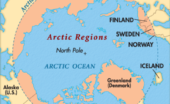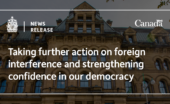Re The UN General Assembly Speaker Schedule is Here! I note that whoever will be speaking for Canada this year…
Wednesday Night #1925 w/ Peter Berezin
Written by Diana Thebaud Nicholson // February 6, 2019 // Wednesday Nights // Comments Off on Wednesday Night #1925 w/ Peter Berezin

Happy New Year, I wish you good health and lasting prosperity.
恭贺新禧,祝身体健康、事业发达。
Gōnghè xīnxǐ, zhù shēntǐ jiànkāng, shìyè fādá.
Check out What will the Year of the Pig bring YOU?
What better way to greet the Lunar New Year, The Year of the Pig, than with an evening with Peter?
While one might expect a focus on China, trade relations, the new Silk Road and related matters, in his most recent report, Peter turns to a disturbing trend:
After rising for thousands of years, human intelligence has begun to decline in developed economies.
This can be seen in falling IQ scores and a decline in math and science test scores.
Environmental factors appear to account for the bulk of this decline, but no one knows what these factors are.
If left unchecked, falling intelligence will severely undermine productivity growth.
This could lead to lower equity multiples, larger budget deficits, and ultimately, much higher government bond yields
Technological advances, particularly in the genetic realm, promise to radically raise IQs.
In a complete abandonment of its one-child policy, China will combine these controversial technologies with pro-natal measures in order to boost sagging birth rates.
The coming Eugenic Wars will be one of the most important economic and geopolitical developments of the 21st century.
We are resisting with all our might the temptation to draw parallels with the decline of human intelligence in the Oval Office e.g. ‘Willful Ignorance.’ Inside President Trump’s Troubled Intelligence Briefings.
Even if Peter has opted out of the obvious link between the Lunar New Year and the hot topic of Huawei and Meng Wanzhou, we cannot. Now that the U.S. has formally requested her extradition, the battle is joined. Maclean’s has a very long and detailed piece Huawei’s Meng Wanzhou: The world’s most wanted woman – very worthwhile. Meanwhile Scotiabank’s Global Week Ahead reminds us that “US-China trade talks move toward less senior levels for the time being while the annual Lunar New Year interrupts progress. Progress was cited by both sides this past week. US Treasury Secretary Mnuchin and US Trade Representative Lighthizer are to travel to China for the next round of talks in mid-February. As yet, no firm date has been set for that or for a possible meeting between Presidents Xi Jinping and Trump.”
On Tuesday evening, Mr. Trump delivered the much anticipated State Of The Union (SOTU) Address. We find it hard to watch, or listen to him, but did follow the online NYT running commentary at the end. It was well written (Stephen Miller) and the delivery was okay, with little if any deviation from the teleprompter. You can read the full text of President Trump’s Second State of the Union Address We will wait until all the reviews are in, but this early commentary in The Atlantic offers some positive suggestions about overcoming the current immigration impasse. Trump’s Revealing Immigration Ad-Lib – Is the president ready to strike a compromise deal?
Reuters reports Trump to choose Treasury’s Malpass to lead World Bank, adding “The nomination of [David] Malpass would put a Trump loyalist and a skeptic of multilateral institutions in line to lead the World Bank, which committed nearly $64 billion to developing countries in the year ended June 30, 2018″, and adding “Malpass in 2017 criticized the World Bank, the International Monetary Fund and other multilateral institutions for growing larger, more ‘intrusive’ and ‘entrenched.’ Over the past two years, Malpass has also pushed for the World Bank to halt lending to China, which he says is too wealthy for such aid, especially when Beijing has subjected some developing countries including Sri Lanka and Pakistan to crushing debt loads with its Belt and Road infrastructure development program. Foreign Policy asks Will David Malpass Run the World Bank or Ruin It? and concludes with this quote “At least it is somebody who is a known quantity, somebody that governments can deal with,” said André Sapir, a former economic advisor to the European Commission and now a senior fellow at the Bruegel think tank in Brussels. “An appointment from Trump—it could have been worse.”
At least this candidate doesn’t sound as awful as John Christy, the newest member of the Environmental Protection Agency’s Science Advisory Board, a climate change skeptic whose research has been debunked and who believes that burning fossil fuels is actually beneficial. And then there is David Bernhardt, a Former Oil Lobbyist, as Head the Interior Dept.
Venezuela is top of the news and Wednesday Night’s two Davids address the crisis. In Venezuela: Can Democracy Be Salvaged?, David T. Jones expresses skepticism that sanctions imposed by the U.S. and allies in South America, Europe, and elsewhere will erode Maduro’s grip on power, even though actions include economic limitations on Venezuelan oil revenues, vigorous support for and recognition of Guaido, and international demand that Maduro call new elections (or face unspecified consequences) – “such moves hardly guarantee that the preferred outcome will eventuate.” Nor is he optimistic that the Venezuelan military will turn against Maduro. He concludes “for the interim, better to “jaw jaw” and hope Maduro’s intestinal fortitude fails—or that his troops refuse to fire on the citizens, and he opts for a dacha outside Moscow.” David Kilgour sounds a more positive note in Venezuelans Can End Their Tyranny “Until recent days, the end of the Maduro regime was only a distant dream for many. Today, democracy, the rule of law and human dignity might well return quickly, but the Ottawa meeting [of the Lima Group] this week should probably limit expectations if Venezuela’s role as a democratic leader in the Americas is to be restored. Amnesty for the military and other reconciliatory offers are no doubt going to be necessary.” With respect to the military, he cites Irwin Cotler, ho sits on the OAS panel investigating crimes against humanity in Venezuela, and thinks the Lima Group should pressure the Venezuelan military to support Guaidó.“It is possible for the community of democracies to leverage the referral to the ICC [International Criminal Court] to put the military leadership on notice that they can be held accountable for their crimes, should they continue to support Maduro.” Another, much darker view is Gwynne Dyer’s Venezuela: ‘Let Trump Be Trump’.
What about Brexit? The best we can offer is this delicious piece: The collective madness behind Britain’s latest Brexit plan
The nation is ignoring reality as deadlines loom
By Ian Dunt, editor of Politics.co.uk, author of “Brexit: What the Hell Happens Now?” and a host on the Remainiacs podcast.
On Tuesday, British Prime Minister Theresa May demanded that her party reject her own Brexit plan so she could go back to negotiations with the European Union and dismantle an agreement that her government reached with the continent, on an impossibly fast timeline, during talks that have already been ruled out. On every level, it is an insane way to behave. The British government is actively sabotaging the work it has spent the past two years completing and then doing a victory dance.The problems all lie with something called the Irish backstop. You wouldn’t know it, given how deranged the party has become about it, but it is a Conservative idea. Their problem was simple: They wanted two contradictory things. On the one hand, the Brexit campaign during the referendum promised to “take back control” from Brussels. That meant returning regulatory decision-making to London. But on the other, it promised that everything would continue as before, with no effect on trade. That is impossible, because as soon as you take back regulatory powers, you have delays on the border with Europe.
The never-ending saga of SNC-Lavalin and the MUHC took another turn last Friday when a smirking Pierre Duhaime left a Quebec provincial courtroom, after having pleaded guilty to helping a public servant commit a breach of trust. Jonathan Montpetit recounts the whole sordid story of fraud and corruption How ‘wilful blindness’ was the undoing of engineering giant SNC-Lavalin’s ex-CEO
Fourteen other charges against him were dropped. Judge Dominique Joly sentenced him to 20 months’ house arrest and 240 hours of community service, and he handed over a $200,000 cheque — a donation to a fund to compensate victims of crime. A breathtakingly light sentence given the outrageous fraud perpetrated. Public reaction was incredulous and disgusted.
Yves Boisvert expressed it best Il vaut mieux être idiot que bandit. This was not the finest hour for Quebec justice.
To almost no-one’s surprise, Bill Brownstein reveals that ‘Coming back is certainly an option,’ Denis Coderre says
“Coming back is certainly an option. Politics has been in my DNA since I was five years old and elected president of my kindergarten class,” said the ever-smiling Coderre, a former federal cabinet minister who represented the constituents of Bourassa from 1997 to 2013. “It’s been a little more than a year. There was an election. There was a result. Two more years, and we’ll see what happens.” Valérie Plante has defenders, but they appear to be outnumbered, especially with the recent vocal grumbling about snow removal, eternal traffic woes, her eco-terrorist sidekick, Luc Ferrandez and the redesign of Phillips Square (do see Beryl Wajsman’s rant -er- editorial Phillips Square: Another example of dogma over reason
We had not heard of Hampshire College until we met Sandy Wolofsky. An exceptional institution, it now faces serious difficulties. Sandy, along with many of its distinguished graduates, is passionate about saving it. Find out why A Small New England College Struggles to Survive Is there still room for unconventional schools like Hampshire College?.
Facebook turned 15 on Monday. The Atlantic comments: As the platform aged from scrappy dorm-room start-up to Silicon Valley behemoth, it’s transformed the social lives of millions, if not billions, of people. The platform has created a new category of relationships: the zombie friendship of Facebook friends who only vaguely keep in touch from afar through posts and updates on the site, extending a friendship far beyond its normal life span. Facebook’s meteoric rise has been predicated on a zealous belief in the power of “connection,” but that blinkered faith has led Facebook to undervalue how the site could be misused. (For more: Alexis Madrigal talks to people present for TheFacebook.com’s founding.)
Have you been following the story of QuadrigaCX, one of Canada’s largest cryptocurrency exchanges? It seems that it has filed for creditor protection in Nova Scotia, leaving thousands of fearful customers with frozen assets and scant information. This comes in the wake of financial and legal troubles with the five-year-old B.C.-based exchange platform — and news that its 30-year old founder, Gerald Cotten, died unexpectedly last December in India. Check out 5 Suspicious Factors about Bitcoin Exchange QuadrigaCX and its $150m in Missing Crypto
Good reads
Foreign Affairs has made A New Americanism – Why a Nation Needs a National Story temporarily paywall-free. If you are not a subscriber, do take advantage of this offer.
The Decline of Historical Thinking
For the past decade, on American campuses, history has been declining more rapidly than any other major, even as more and more students attend college.
By Eric Alterman
Having ignored questions of economic inequality for decades, economists and other scholars have recently discovered a panoply of effects that go well beyond the fact that some people have too much money and many don’t have enough. Inequality affects our physical and mental health, our ability to get along with one another and to make our voices heard and our political system accountable, and, of course, the futures that we can offer our children. Lately, I’ve noticed a feature of economic inequality that has not received the attention it deserves. I call it “intellectual inequality.”
I do not refer to the obvious and ineluctable fact that some people are smarter than others but, rather, to the fact that some people have the resources to try to understand our society while most do not.



